Related Research Articles
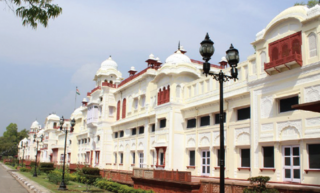
Patiala is a city in southeastern Punjab, northwestern India. It is the fourth largest city in the state and is the administrative capital of Patiala district. Patiala is located around the Qila Mubarak constructed by the Sidhu Jat chieftain Ala Singh, who founded the royal dynasty of Patiala State in 1763, and after whom the city is named.
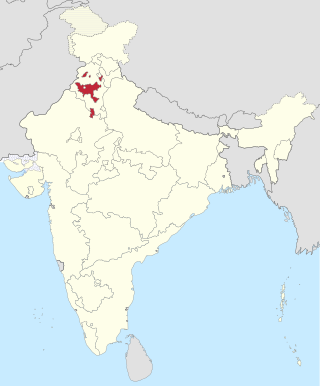
The Patiala and East Punjab States Union (PEPSU) was a state of India, uniting eight princely states between 1948 and 1956. The capital and principal city was Patiala. The state covered an area of 26,208 km². Shimla, Kasauli, Kandaghat and Chail also became part of the PEPSU.
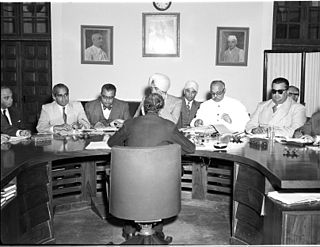
Rajpramukh was an administrative title in India which existed from India's independence in 1947 until 1956. Rajpramukhs were the appointed governors of certain Indian provinces and states.

The Order of British India was an order of merit established in 1837 by the East India Company for "long, faithful and honourable service". The company's powers were removed after the Indian Mutiny, and the Order was incorporated into the British Honours System in 1859. The order became obsolete in 1947, after the partition of British India into the Dominion of India and the Dominion of Pakistan.

Majha is a region located in the central parts of the historical Punjab region split between India and Pakistan. It extends north from the right banks of the river Beas, and reaches as far north as the river Jhelum. People of the Majha region are given the demonym "Mājhī" or "Majhail". Most inhabitants of the region speak the Majhi dialect, which is the basis of the standard register of the Punjabi language. The most populous city in the area is Lahore on the Pakistani side, and Amritsar on the Indian side of the border.

Maharaja Sir Bhupinder Singh, was an Indian royal and cricket player. He was the ruling Maharaja of the princely state of Patiala in British India from 1900 to 1938. He was born in a Sidhu royal Jat Sikh family.
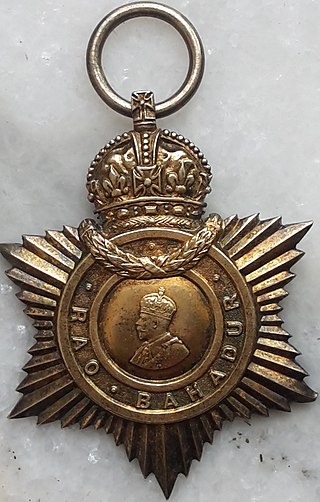
Rai Bahadur, abbreviatedR.B., was a title of honour bestowed during British rule in India to individuals for faithful service or acts of public welfare to the Empire. From 1911, the title was accompanied by a medal called a Title Badge. Translated, Rao means "prince", and Bahadur means "brave" or "most honourable". Bestowed mainly on Hindus, the equivalent title for Muslim and Parsi subjects was Khan Bahadur. For Sikhs it was Sardar Bahadur.

Preneet Kaur is an Indian politician who served in the Government of India as a Minister of State in the Ministry of External Affairs from 2009 to 2014. She is married to Amarinder Singh, who was the 15th Chief Minister of Punjab. She joined the Congress party, to which her husband also belonged once, and contested parliamentary elections repeatedly from the Patiala constituency. In February 2023, she was suspended from party for supporting BJP leader and her husband Amarinder Singh. She won the elections of 1999, 2004 and 2009, but lost her seat in the elections of 2014 and made a comeback by winning again in 2019.

Sardar Bahadur Risaldar Major Ganda Singh Datt, was a decorated soldier in the British Indian Army, who served in the 19th Regiment of Bengal Lancers.

Maharaja Sir Yadavindra Singh was the 9th and last ruling Maharaja of Patiala from 1938 to 1971. He was also an Indian cricketer who played in one Test in 1934.

Mehtab Kaur, was the second wife of the ninth and the last Maharaja of Patiala Yadavindra Singh (1913–1974). She was the mother of Amarinder Singh, the former Chief Minister of Punjab. Had it not been for the erstwhile Indian princely families being stripped of their titles in 1971, upon the death of her husband she would have been considered Rajmata, and in popular usage is commonly referred to as such.

Sir Pratap Singh Nabha, KCSI was the last ruling Maharaja of Nabha. The state of Nabha was merged into India in 1948. It was annexed to Patiala and the East Punjab States Union, a new political administrative unit that comprised all the states of the Punjab.

Sardar Gian Singh Rarewala was an Indian politician and the first Chief Minister of the former Indian state of Patiala and East Punjab States Union.

The Nakai Misl, founded by Sandhu Jats, was one of the twelve Sikh Misls that later became the Sikh Empire. It held territory between the Ravi and Sutlej rivers southwest of Lahore in what became Pakistan. The misl fought against the Sials, the Pathans and the Kharals before it was incorporated into the Sikh Empire of the Sukerchakia Misl by Ranjit Singh.
The New Year Honours 1909 were appointments by King Edward VII to various orders and honours to reward and highlight good works by members of the British Empire. They were announced on 5 January 1909.
The New Year Honours 1921 were appointments by King George V to various orders and honours to reward and highlight good works by members of the British Empire. They were published on 31 December 1920.
Amrit Kaur Tewari was an Indian dental physician and a former Dean of the Post Graduate Institute of Medical Education and Research (PGIMER), Chandigarh. She also served as Head, Oral Health Sciences Centre, PGI. She was the daughter of Sardar Tirath Singh Gurum who was the minister in the Erstwhile PEPSU.
The 1911 Delhi Durbar was held in December 1911 following the coronation in London in June of that year of King George V and Queen Mary. The King and Queen travelled to Delhi for the Durbar. For the occasion, the statutory limits of the membership of the Order of the Star of India and the Order of the Indian Empire were increased and many appointments were made to these and other orders. These honours were published in a supplement to the London Gazette dated 8 December 1911.
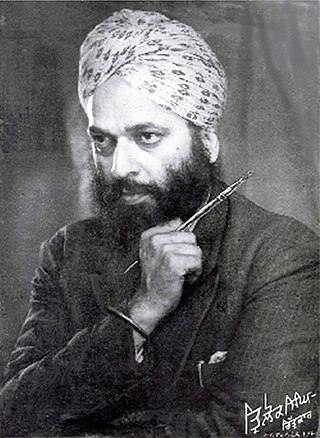
Trilok Singh Chitarkar (1914-1990) was a versatile Indian painter. He has unique style of presenting himself through variety of themes - Sikh religion, history, culture, folk lore, love legends, portraits, social evils, nature, illustration of Gurbani, Shabads, visuals in Punjabi Encyclopedia and books. He was well versed with deep knowledge of Gurbani, history and religion. He knew many languages i.e. Gurmukhi, Punjabi, Hindi, English, Urdu, Persian, Assamese and Bengali. He translated articles from Bengali to Punjabi and published these in the book titled Bangla De Daab in 1974. The Artist was honoured in 1973 by the Chief Minister, Punjab,India Giani Zail Singh at a state level function organised at his residence, Chitralok, Patiala. Language department, Punjab published a book in Punjabi-Chitralok's Contribution to Art and released on the 70th birthday of the artist, December 10, 1984 at a special function organised in Central Library at Patiala for his contribution to Art.
He is the first Punjabi Artist on whose works Ph.D. degree Art of Trilok Singh was awarded by Punjabi University, Patiala. A Gold medal has been established in the name of the artist and it is awarded to the topper of M.A. Fine Arts. He was appointed as a State Artist in erstwhile PEPSU state of Punjab in 1948 and later worked as Artist in Department of Languages, Punjab. He lived and worked all over India and spent last years of his life in Patiala town in Punjab state in India.
Raghbir Singh was an Indian politician, freedom fighter who served as 2nd Chief Minister of erstwhile PEPSU state.
References
- ↑ "Rai Bahadur Tirath Singh Bakshi". geni_family_tree. Retrieved 17 April 2020.